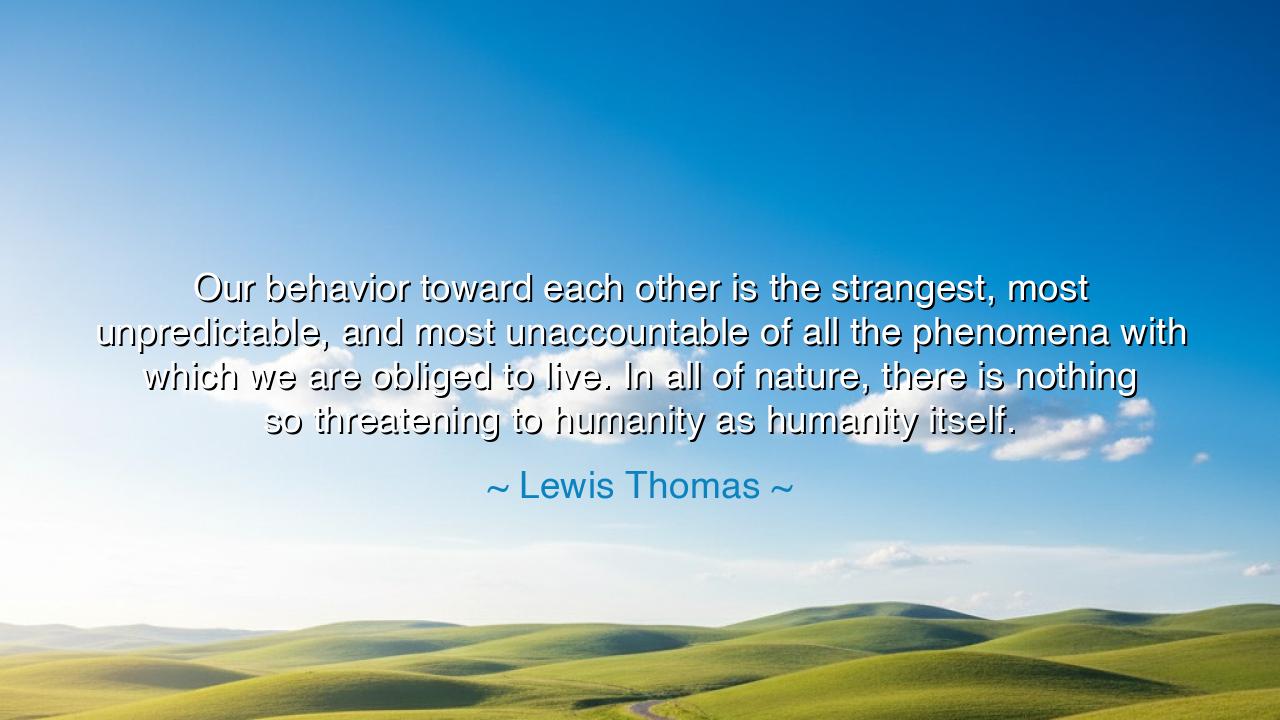
Our behavior toward each other is the strangest, most
Our behavior toward each other is the strangest, most unpredictable, and most unaccountable of all the phenomena with which we are obliged to live. In all of nature, there is nothing so threatening to humanity as humanity itself.






Hear, O children of reflection, the voice of Lewis Thomas, the physician-philosopher who pondered both science and the soul, who declared: “Our behavior toward each other is the strangest, most unpredictable, and most unaccountable of all the phenomena with which we are obliged to live. In all of nature, there is nothing so threatening to humanity as humanity itself.” These words strike like thunder, for they remind us that the greatest mystery is not the stars, nor the oceans, nor the secret workings of the cell—it is the human heart. For within us dwells both the power to heal and the will to destroy, both compassion that saves and cruelty that shatters.
The ancients saw this paradox clearly. They gazed at storms, earthquakes, and plagues, trembling at their might. Yet even then, they feared above all the wrath of man against man. Armies could lay waste to cities; kings could plunge nations into ruin; betrayals between friends could cause more anguish than any famine. Thus Thomas, in the age of modern science, echoed a truth older than empires: that humanity itself is the most unpredictable force in the world. Nature is fierce, but it is consistent. The lion kills to eat, the storm breaks to release, the fire consumes only what lies before it. But man kills for pride, wages war for ambition, and turns his ingenuity toward destruction as often as creation.
Consider the story of the 20th century. Two great wars tore across the globe, killing more souls than any plague. The atom, once split for knowledge, was quickly shaped into a weapon that could annihilate nations in an instant. Disease, famine, and earthquakes are terrible, but they pass. Yet the cruelty and folly of human behavior, sharpened by intelligence and multiplied by pride, threaten all life itself. In this way, Thomas reveals the deep irony: the species most gifted with reason is also the one most likely to undo its own existence.
And yet, there is another side. For just as the human hand invents the sword, so too it creates the salve. After wars came treaties, after tyranny came revolutions for freedom, after cruelty came movements of compassion. The same unpredictable heart that burns with rage also shines with mercy. Who could have predicted that after the horror of the Second World War, nations would form the United Nations, seeking, however imperfectly, to bind humanity in dialogue rather than endless battle? The same capacity for destruction can be turned toward healing, if guided by wisdom.
The meaning of Thomas’s words is this: our greatest task is not to conquer nature, for she follows her own rhythm. Our greatest task is to master ourselves. To understand that the real danger lies not in beasts or storms, but in our own ungoverned passions, our unchecked greed, our refusal to see one another as kin. The threat is also the opportunity: if we can learn to guide our behavior with compassion rather than fear, with justice rather than vengeance, then the very unpredictability of humanity can become a fountain of creativity and renewal.
The lesson is plain. Each person must treat his dealings with others as sacred ground. For every word spoken has the power to heal or to wound, every act carries within it the seed of peace or the shadow of war. To master this is harder than taming fire or crossing the seas. It requires daily vigilance: to listen before judging, to forgive before condemning, to act with kindness even when anger tempts us to cruelty. This is the true art, greater than all sciences—the art of being human with humanity.
Practical actions flow from this truth: begin with small acts of mercy. Speak gratitude to those around you. Choose reconciliation over vengeance, patience over rage. Teach the young not only knowledge of the world, but reverence for each other. Support leaders who call for peace rather than division. And in your private soul, do not despise your neighbor, for such contempt is the seed from which destruction grows.
Thus remember Lewis Thomas’s wisdom: “There is nothing so threatening to humanity as humanity itself.” But the reverse is also true: there is nothing so promising, so redemptive, so filled with potential for greatness as humanity itself. If we turn our strange unpredictability toward love instead of hate, then we shall become not the greatest danger of nature, but its highest glory.






AAdministratorAdministrator
Welcome, honored guests. Please leave a comment, we will respond soon